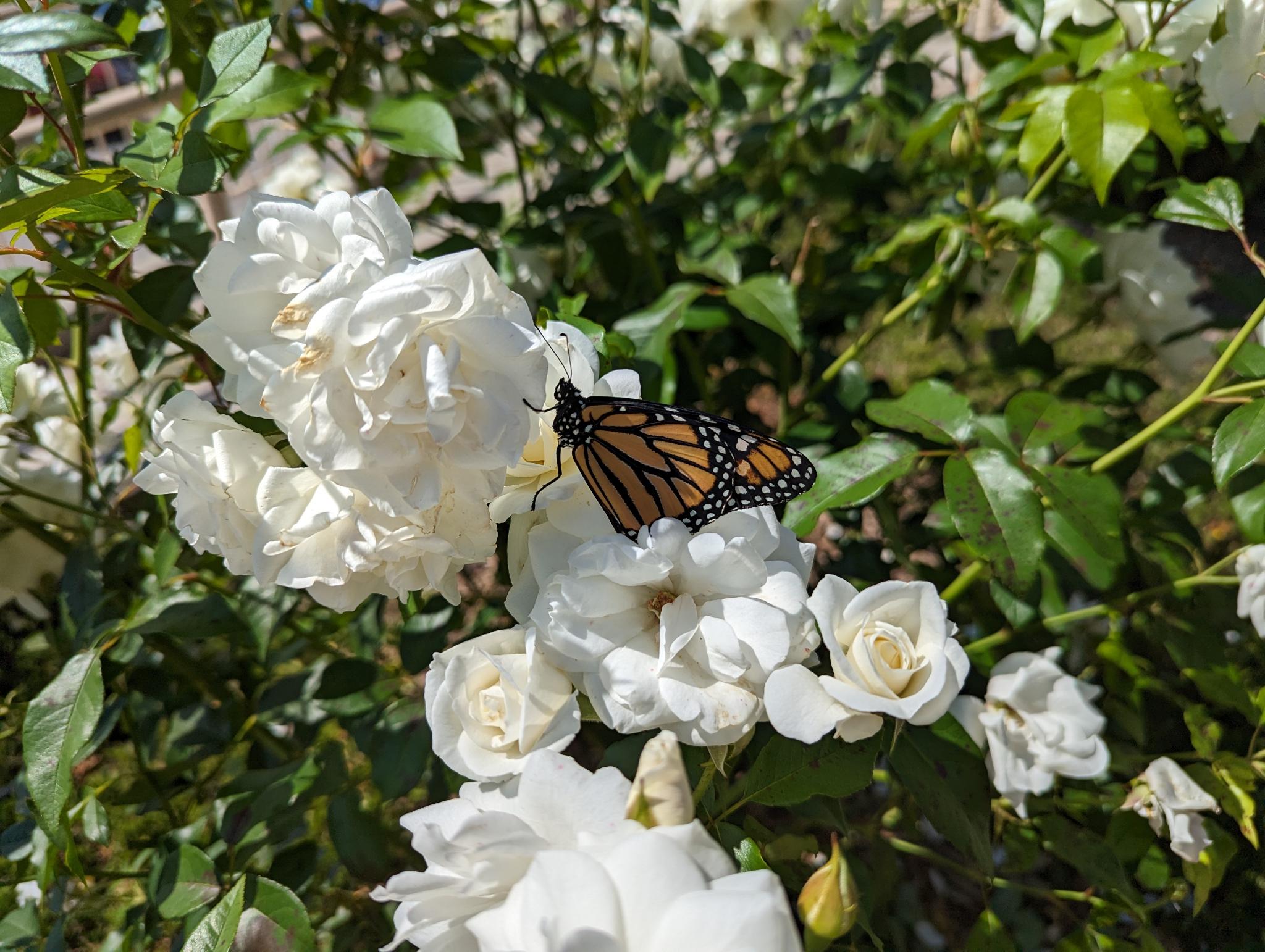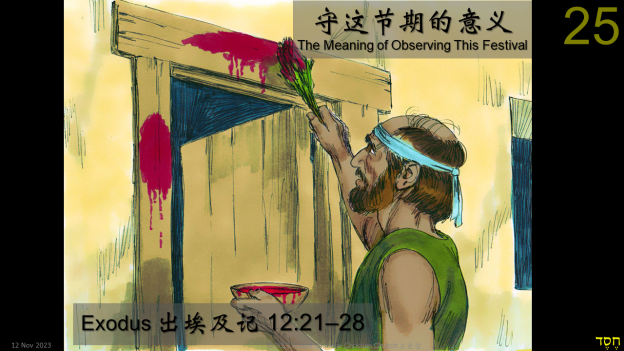守这节期的意义 The Meaning of Observing This Festival
Remember these points
I put these points at the top of my sermon-prep template to remind myself every week:
- Show that main point of passage relates to Jesus and his saving work
- (1 Cor 1:18) A truly gospel-centred message will not be acceptable in a synagogue or mosque
- Did I proclaim the gospel as the headline news of the sermon, rather than as a “by the way…”?
- Unbelievers are called to repent, believe, and be saved
- Believers are encouraged to abandon their old self, renew their minds, put on the new self in Christ
- Preach simple sermons, so that God’s people can see Christ more clearly and love him more dearly
News
Hook

Four pictures, four festivals
Only the young people should answer
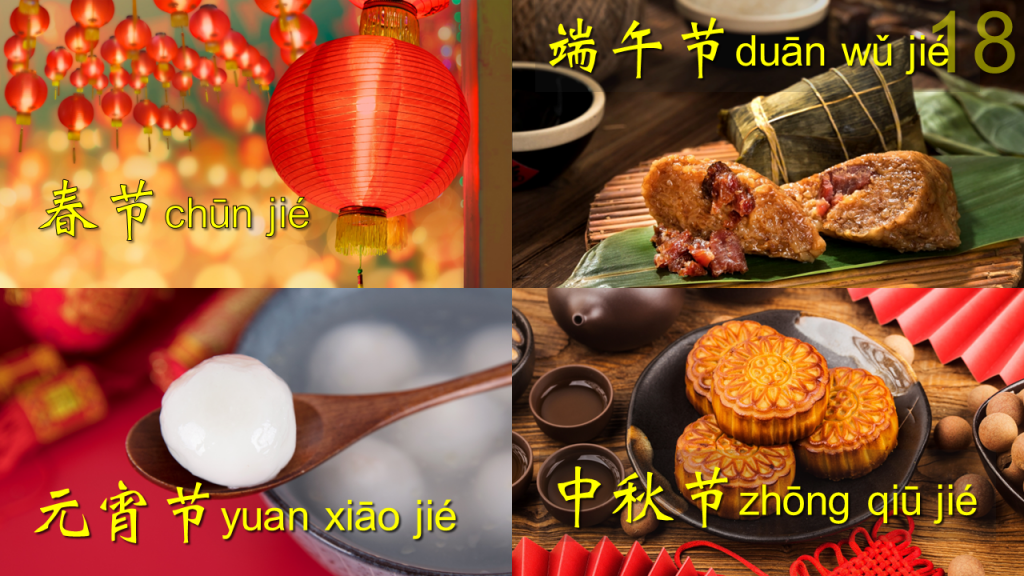
- Can you identify (from the picture) what is the festival?
- What do we do at each festival?
- What’s the origin of the custom for each festival?
What we hope to learn from this exercise?
- If we don’t pass on our traditions to the next generation, they will very quickly forget.
- We pass on cultural traditions. But more importantly, we should pass on our Christian traditions.
- Remembrance day yesterday, the “don’t forget” idea.
- Same point in today’s passage: “don’t forget what God did.”
Passage
于是,摩西召了以色列
的众长老来,对他们说:
「你们要按着家口取出
羊羔,把这逾越节的羊
羔宰了.拿一把牛膝草,
蘸盆里的血,打在门楣
上和左右的门框上.你
们谁也不可出自己的房
门,直到早晨.因为耶和
华要巡行击杀埃及人,
他看见血在门楣上和左
右的门框上,就必越过
那门,不容灭命的进
你们的房屋,击杀你们.这
例,你们要守着, …
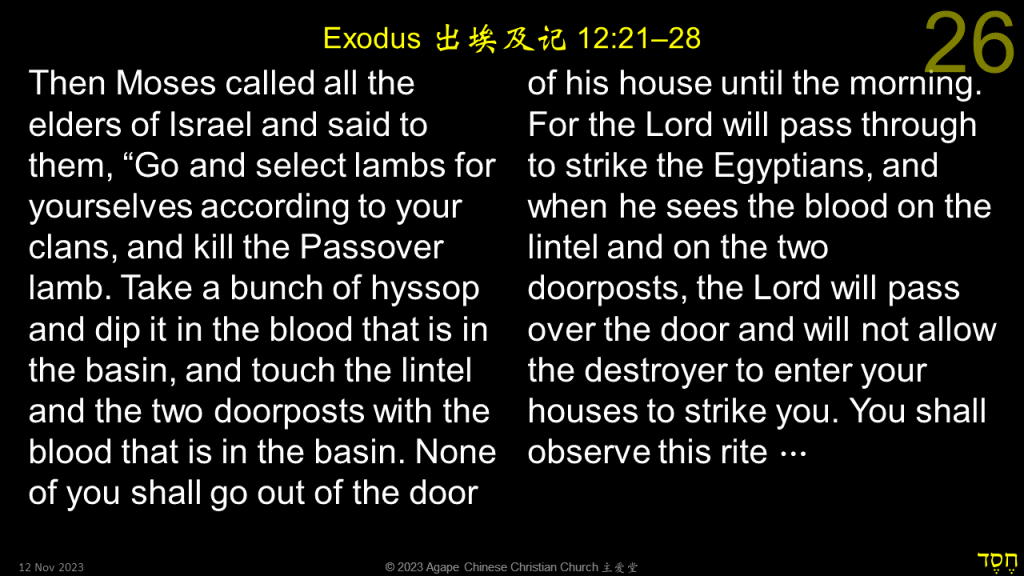
…作为你们和你们子孙
永远的定例.日后,你们
到了耶和华按着所应许
赐给你们的那地,就要
守这礼.你们的儿女问
你们说:『行这礼是什
么意思?』你们就说:
『这是献给耶和华逾越
节的祭.当以色列人在
埃及的时候,他击杀埃
及人,越过以色列人的
房屋,救了我们各家.』
」于是百姓低头下拜.
耶和华怎样吩咐摩西、
亚伦,以色列人就怎样
行.

大纲 Outline

Section 1 羊羔的血 The Lamb’s Blood
Passage
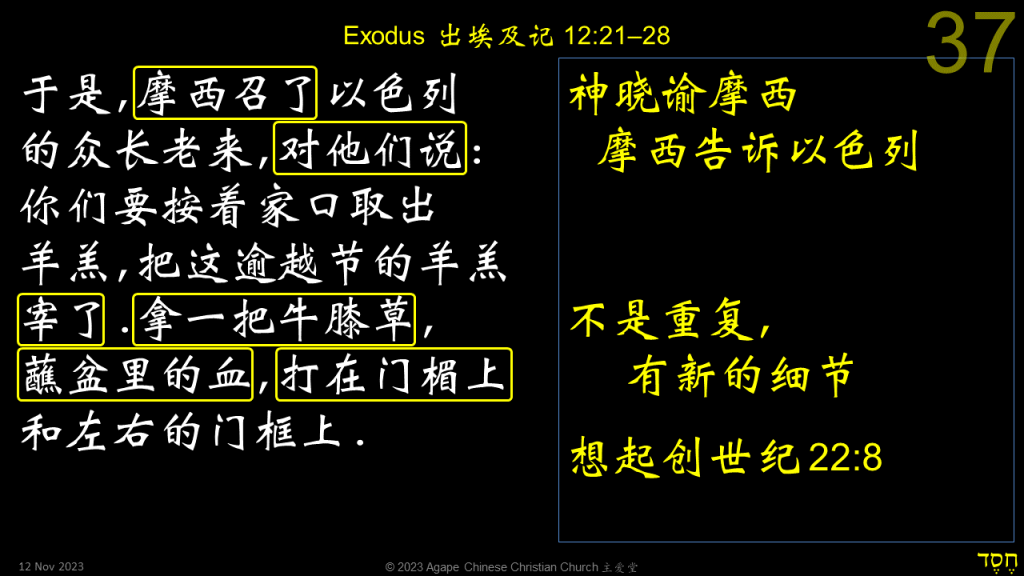
- Two weeks ago, in Exo 12:1, we had God telling Moses and Aaron. Now Moses is passing on God’s message to the Israelites.
- Moses told the elders, and the elders would then pass it on to the rest of the people.
- This sounds like a repetition of what we saw last week and two weeks ago, but it’s not. There are details here that weren’t disclosed earlier, and vice versa. There’s no need to repeat everything, so Moses simply wrote down the basic summary for us to read.
- This reminds us of Gen 22:8. Abraham was bringing Isaac up a mountain, obeying God’s command for him to sacrifice Isaac. Isaac noticed that they didn’t bring a lamb, so he asked his father (Gen 22:7神必自己预备作燔祭的羊羔), “but where is the lamb for a burnt offering?” Abraham answered, “God will provide for himself a lamb for the burnt offering, my son.” Fifteen-hundred years after the Exodus, God will indeed provide a lamb, his own son Jesus, who will be sacrificed for our sins.
- The hyssop branch is very appropriate as it’s like a big paint brush. Later in the wilderness, the priests will also use hyssop branches to sprinkle the sacrificial animal’s blood on the altar.
- In Gen 22:8, God provided the lamb that replaced Isaac, allowing Isaac to live. The lamb will continue to provide deliverance for larger and larger groups of people:
- Replaced Isaac, one person
- In Exodus, delivered a family during 1st Passover
- In the wilderness on Day of Atonement, delivered an entire people (Israel)
- In the NT, Jesus, the Lamb of God, delivered the world
Section 2 他必越过 He Will Pass Over
Passage

- They’re to stay inside their own homes to prevent death. The houses with the lamb’s blood on the door frame are are safe zones. When you’re inside the safe zone, God (or the destroyer that he sends to kill the firstborns) will not kill you. But if you’re outside, whether you’re Israelite or Egyptian, you’ll be in danger.
- When YHWH sees the blood on the door frame, he will “pass over” the door, sparing whoever is inside from death.
- Notice that to avoid death, they have to follow YHWH’s instructions. Salvation comes only through YHWH’s method, nothing else. For the Israelites in Exodus, it’s by means of the lamb’s blood. For us, it through faith in God’s son Jesus Christ.
Section 3 这例要守着 You Should Observe This Rite
Passage
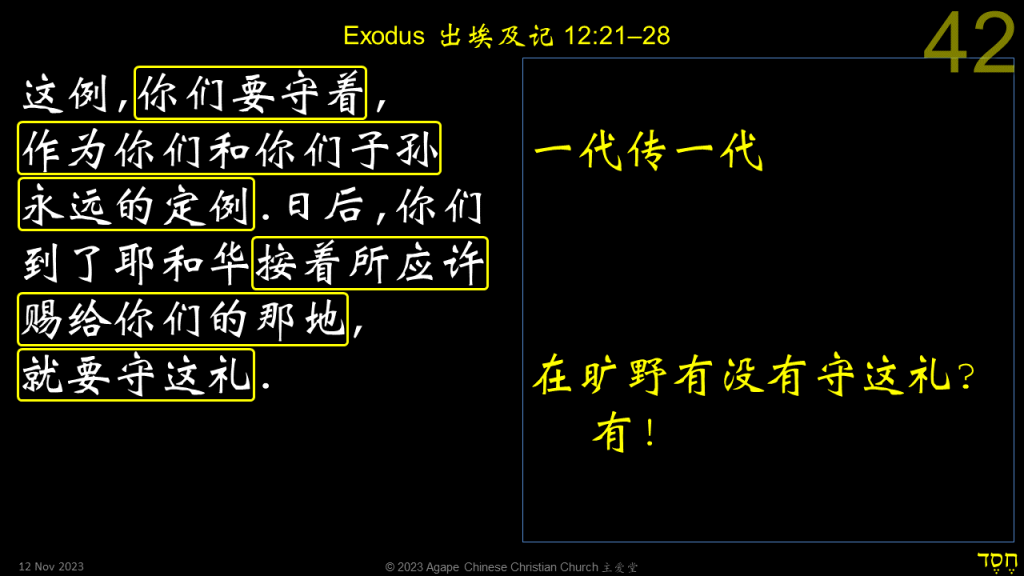
- They are to celebrate Passover from generation to generation.
- When they get to the Promised Land, they will continue to celebrate Passover.
- The promise was given by whom? YHWH. Given to whom? Abraham.
- Did they observe Passover in the wilderness? Yes, they need.
Section 4 这礼是什么意思 What Does This Service Mean?
Passage
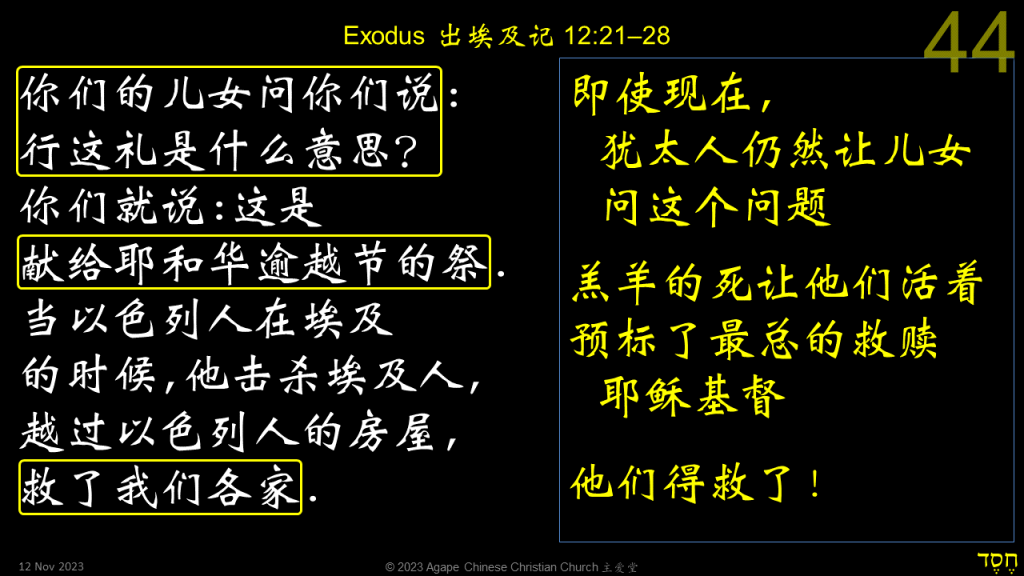
- The children are to ask, and a parent (usually the father) will answer. Even today, Jewish families keep this tradition when they celebrate Passover. Usually the youngest child will ask, “Why is tonight different from all other nights?” The father will then recite the story of how YHWH saved them that first Passover night in Egypt.
- The death of the lamb allowed the Israelites to live. This is foreshadowing our salvation through Jesus’ death. This is why John called Jesus “the Lamb of God” (John 1:29 看哪,神的羔羊). Paul said the same thing in 1 Cor 5:7, “For Christ, our Passover lamb, has been sacrificed.” (因为我们逾越节的羔羊基督,已经被杀献祭了) The Passover lamb is a “type” of the ultimate sacrifice: Jesus, the son of God.
Section 5 百姓低头下拜 They Bowed and Worshipped
Passage
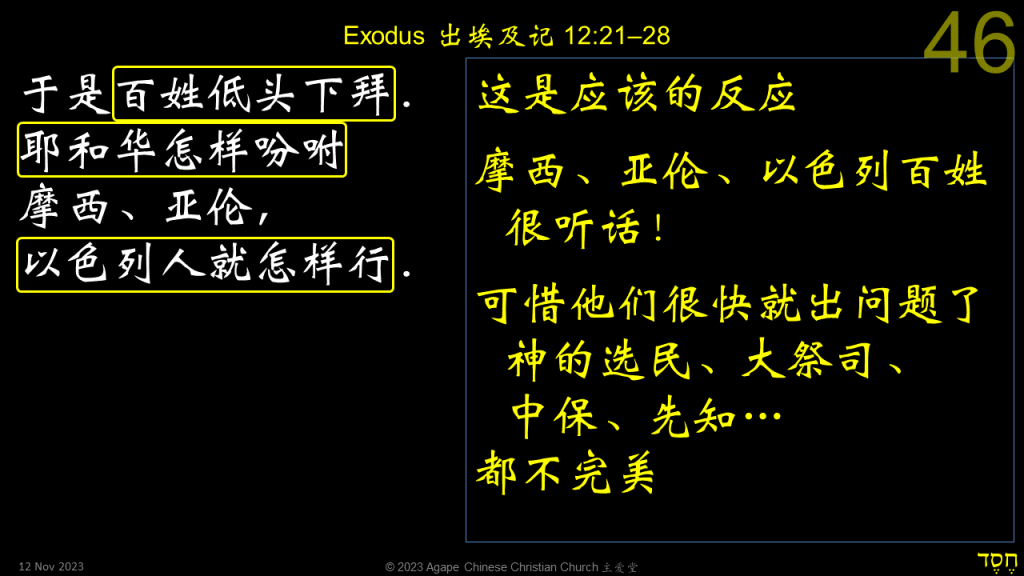
- The people bowed their heads and worshipped. This is the very appropriate reaction for knowing that YHWH has ensured their salvation.
- Remember the last time we heard from the Israelites? Back in Exo 5:21, when they said to Moses and Aaron, “because you have made us stink in the sight of Pharaoh and his servants.” (因你们使我们在法老和他臣仆面前有了臭名)
- Now they wait for deliverance. Everything is set.
- Notice since 15 Oct, we haven’t seen someone, who is missing in 3 consecutive sermons?
- Do we bow our heads and worship, knowing that we’ve been saved? This is why weekly get-together on Sundays with everyone is so, so important. We get together to worship, to give thanks to God, to encourage and pray for each other, and to exhort (劝勉 Quànmiǎn) each other.
- Notice that Moses, Aaron, and the people were all very obedient! This won’t last long though. As we continue through Exodus, we’ll see all of them going bad in different ways (Moses included).
- This only goes to show that none of us are perfect, all of us as sinful. We are in sore need of a saviour.
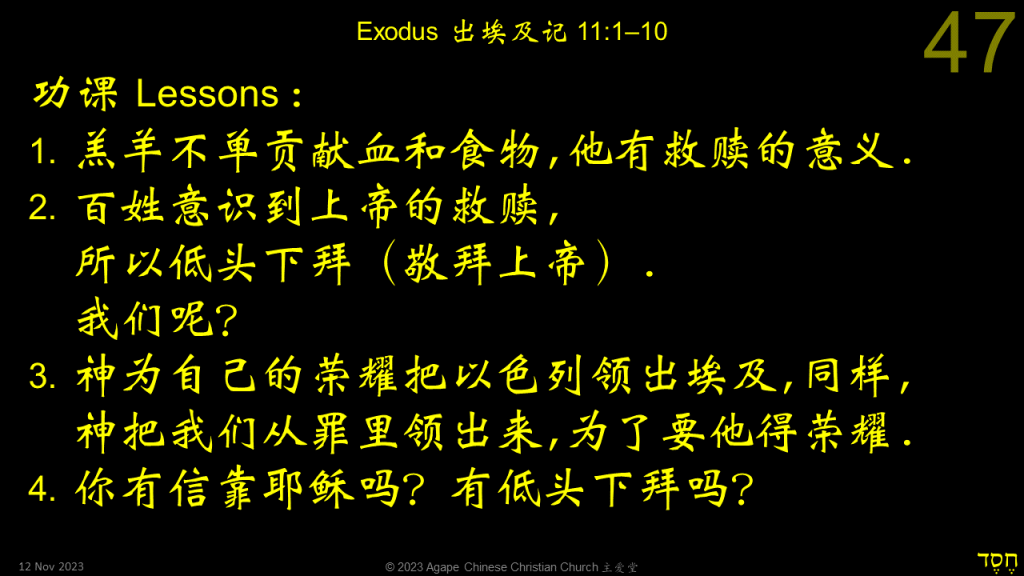
Lessons:
- The lamb isn’t just to provide the blood for the door frame and the meat for food. It is also about salvation, because the death of the lamb saved the family inside the house.
- The people realised God’s salvation, so they bowed their heads and worshipped.
Do we do the same? - God brought Israel out of Egypt in order to bring glory to his name. In the same way,
God brought us out of sin’s bondage, so as to bring glory to his name. - Do you believe in Jesus? Have you bowed your head and worshipped?
与我有什么关系? So What?

Barna Group Survey
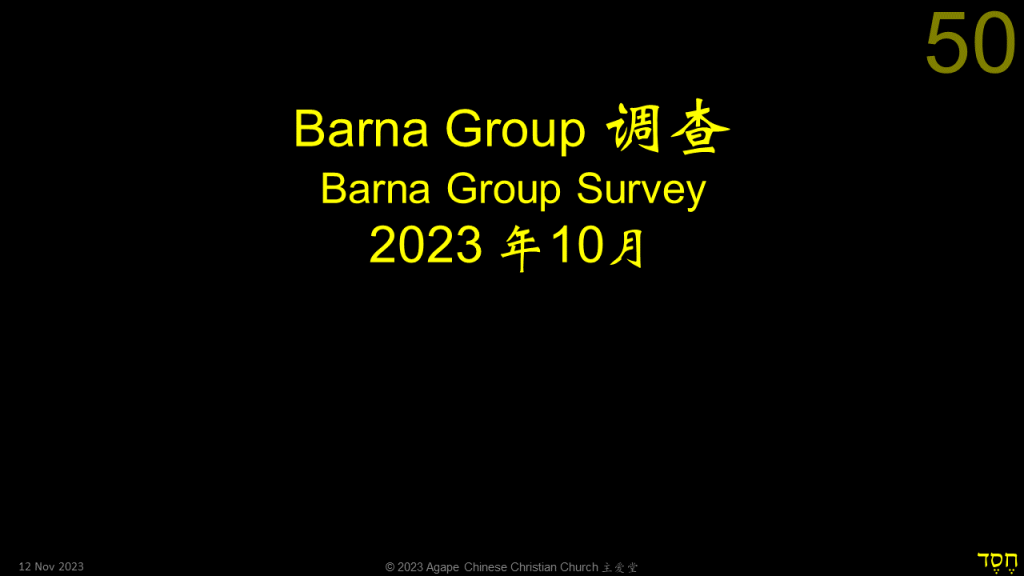
Survey from the Barna Research, together with Arizona Christian College, published just last month (3 Oct 2023). You can read a summary here (PDF): Raising Spiritual Champions.
Barna identified seven basic beliefs (基石信念 cornerstone beliefs) that that “dramatically increases the likelihood of a person developing a biblical worldview.” Someone who believes all seven beliefs will have an “83% chance of developing a biblical worldview.” Rejecting one or more of these beliefs, and the probability of developing a biblical worldview drops to just 2%.
A person’s worldview is typically formed before they reach 13 years old. Here’s the result of the survey of adolescents. Sadly, the survey shows that a majority of adolescents in America (and most likely in Canada as well, if not worse) believes in only a few of the cornerstone beliefs.

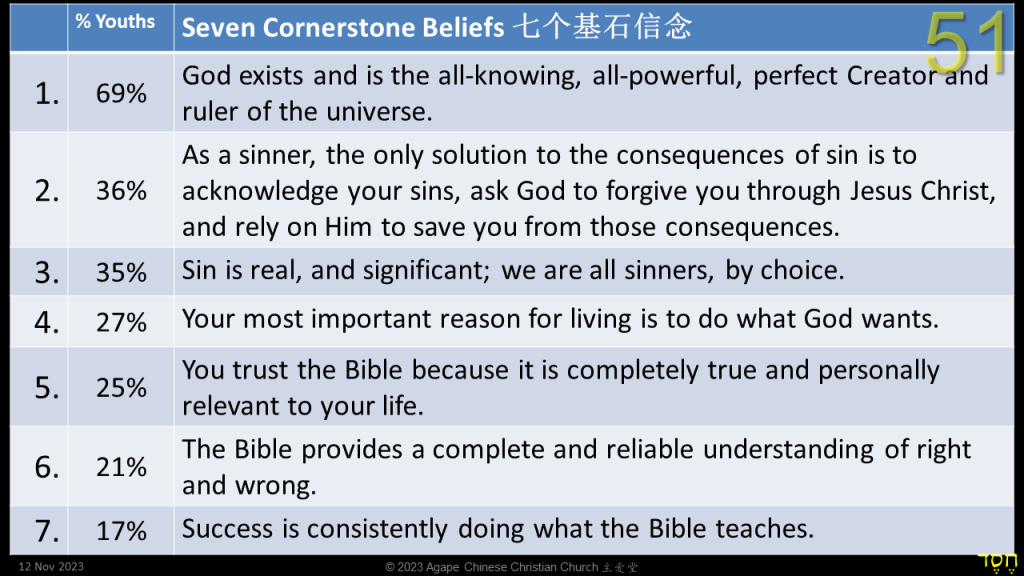

与我有什么关系? :
- 『行这礼是什么意思?』:孩子们的提问
- 一代传一代,不能忘记.
- 我们给下一代传下什么理念?
- 我们的优先事项是什么?
- 我们有圣经的世界观吗?每天读圣经吗?
- 我们每周日都去教堂敬拜吗?
- 我们有爱神、爱人吗?
Matt 13:22 “撒在荆棘里的,就是人听了道,后来有世上的思虑,钱财的迷惑,把道挤住了 (Jǐ zhù),不能结实。”
“As for what was sown among thorns, this is the one who hears the word, but the cares of the world and the deceitfulness of riches choke the word, and it proves unfruitful.”
